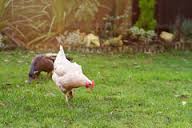Approved Trader
Keeping Chickens
Air Conditioning
Services

Find a local trader and receive competitive FREE quotes?
In today`s modern world fresh food is at a premium and increasingly larger numbers are wanting to keep chickens in their gardens for the production of fresh eggs, but the keeping of chickens is not for everyone and should be considered carefully before starting to keep chickens. There is a simple test to see if the path for keeping chicken is suitable for you, firstly you need room to keep your chickens, ideally grass, there will be initial costs that includes housing for the chickens, as well as fencing to keep the chickens in and unwanted foxes and other predators out. Grass is the natural food supplement for chickens and poultry although chickens can also feed on shrubs, plants and insects so may cause damage to gardens so must also be considered Chicken Housing - There are a number of options for creating shelter for your chickens to protect them against the elements and predators:
Chicken Housing - There are a number of options for creating shelter for your chickens to protect them against the elements and predators:
- - Use an existing building, kind old barn
- - Build yourself a chicken coop,
- - Buying a prefabricated henhouse (for those who do not have time or do not know tinker.)
Inside the barn, place perches and nesting boxes required; and the manger for feed. On the ground, the bedding must be periodically renewed, options include paper, shavings or straw.
The housings temperature must be kept cool in the summer and hot in the winter and give shelter to the chickens from the wind and rain.
Food For Chickens - It is imperative that the diet given to your poultry is complete and balanced (particularly protein, vitamins and trace elements). Only distribute wheat to poultry that do not have access to an outside run is totally inadequate!
You are able to purchase chicken feed prepare your own mash / feed for your chickens but you must be sure that it is balanced.
Breeders and layers can be fed food that aid "laying" increasing the amount of eggs produced from your chickens. There are 2 categories: the complete feed and supplementary food for distribution with a mixture of grains (not too much corn that tends to fatten poultry). If you only have a small flock, you can distribute the remains of their meals (bread, salad, vegetables, meat ...), the hen is an omnivorous animal!
Whatever the age of your poultry, remember that drinking water is clean, fresh and frequently renewed. A vitamin supplement may be circulated from time to time in the drinking water. For chickens, also distribute crushed oyster shells adding limestone to the chicken`s diet that is required for the formation of eggs.
Choice of Chicken Breed - There are numerous options available for chickens for your garden, with intensive strains that have been bred to lay large number of eggs or for meat, obviously for most homeowners a breed for egg production is favored. There are also a wide selection of beautiful chicken breeds. The most decorative breeds of chicken are usually found among dwarf breeds. Among the most attractive: Bantam Beijing, Wyandotte, Sebright, Padua (photo cons: rooster Padua chamois), Dutch crested. However, some larger breeds are not without beauty, far from it; everything is a matter of personal taste.
The main chicken diseases and their treatments
This section is not intended to treat all diseases of fowls, but to show some of the main conditions that might occur, in the event of ill health it is always best to get professional help and advice. The hygiene, cleanliness and precautions (quarantine new animals, fight against rats and mice, insectrs etc.) will also help avoid ill health.
Another tip: do not deal blindly. If in doubt, consult a veterinarian. Unfortunately, many veterinarians do not specialize in poultry! And therefore not interested in them; especially as the cost of treatment often exceeds the economic value of a chicken.
Coccidiosis - Coccidiosis is a well known disease to poultry farmers, is due to a protozoan, a very small parasite (coccidia), it mostly affects young animals. There are different coccidiosis: coecal bleeding, acute bowel, duodenum, due to several species of coccidia. Poor hygiene, overcrowding, hot and humid conditions favor the development of these parasites.
The symptoms are varied: sometimes with streaks bloody diarrhea, sadness, intense thirst, ruffled feathers, pale face. In acute cases, death occurs quickly.
Coccidiosis is a serious disease that should be treated promptly. Fortunately, the products available to us are many and quite effective.
Note that poultry can be immunized against coccidiosis when subjected to low contamination. There is a sort of "competition" between coccidiosis and immunity: as breeding conditions, it`s one or the other wins.
Worms - Ascaris worms are white, round, 3 to 7 cm long, a diam?tre January-February mm, living in the gut. Given their size, they are easy to spot with the naked eye during an autopsy.
Capillaries, so called because they are thin as the hair, are longest in 1 to 2 cm, and therefore not easily visible to the naked eye. They live in the crop, esophagus and intestine.
Heterakis are small to 1 to 2.5 inches long and quite thick (0.5 mm diameter), living in the caeca.
Tapeworms are flat worms lodged in the lining of the intestine. Their length is variable from 3 mm to 10 cm. They are often divided into series of rings.
Treatment against these parasites is using versatile worming. Prefer individual treatments in tablet form (that is put in the bird`s beak): you are so certain that all birds are dewormed. We often recommend 2 treatments per year: one before and another after winter.
External parasites - Commonly called the "lice", these parasites are a nuisance to poultry. Inspect the feathers of your birds, especially around the anus: if you see "critters" and nests, act! Treat with a veterinary insecticide powder (very effective)
Other common parasites mites that cause scabies legs. You see white scabs on the legs (tarsus) your poultry. Take action immediately using a lotion antigale you find your veterinarian or pharmacist.
Coryza - It results in sneezing, runny. Poultry shake their heads to try to get rid of the exudate that flows from the nostrils. The inflammation extends to the eyelids, eyes are swollen and closed; patients will supply more and die if you do not intervene at the first symptoms.
This disease is cured with antibiotics to the water in the food or injection. The healing of certain subjects is sometimes spectacular and occurs in 48 hours, but other subjects may be affected by the common cold for longer.
Newcastle disease or "pseudo fowl plague"
It takes many forms: hyperacute, acute or subacute. The result is often the same; However, in the subacute form, death is slower. All livestock can be destroyed, and survivors often have sequelae. There are many symptoms: sudden sepsis, high fever, loss of appetite, intense thirst, ruffled feathers and round back, depression, respiratory, nervous disorders especially in the subacute form.
There is no treatment, but there are different vaccines that can be administered in the drinking water, by spraying (the several bands), by instillation into the eye or the nostrils (especially for any youth). Young chicks can be vaccinated at birth; regular reminders are needed.
Pecking - It is not a disease. It`s a mania possessed by certain poultry feathers tear each other. It occurs mostly in young or during molting, when the growth of feathers. These are so engorged; poultry plucking a feather from neighboring blood appears; attracted by it, other poultry continue and the bird can dive and die if you do nothing. We even experiencing frequent cases when gutting the cloaca is reached: it is longer than the pecking, cannibalism.
What causes the pecking? The not quite balanced diet lacks protein or greenery, overcrowding, idleness ...
What if pecking? Isolating the subject bitten, treat the area reached with a wound healing product spray based on aluminum.
You can find more tips in the many books on keeping chickens as well as within our website.
The cleanliness of drinkers and feeders is essential for keeping chickens in your home and should not be neglected.
Drinkers and feeders should be located to avoid:
- Food waste
- Stop food contaminated with droppings and litter.
- Stop water soiled with manure and litter.
Always make sure to keep a clean, dry bedding because the spread of coccidiosis is promoted by the heat and humidity of the litter; hence the importance of having a good ventilation without drafts in order to remove excess moisture and ammonia, a source of respiratory problems.
Natural light has its importance because it has a bactericidal and cleansing, as well as improving the well being of the birds happiness and health.
Ensure the absence of external parasites, because they weaken poultry by piercing and drawing blood. You should know that bacterial and viral infections can be transmitted by sucking insect.
Ensure a healthy balanced diet, rich in minerals and vitamins . This is important because if the bird is not well fed and health, the animal will have a weakened body which will reduce egg production and increase the chance of any pathogenic microorganism find an ideal area to multiply and wreak havoc on farms.
The use of white vinegar, cider vinegar or acetic acid in drinking water is still a favorable way of helping boost the chicken own immune system. At a dose of 250 cc to 10 liters of water for 7 days (or equivalent vinegar regarding acetic acid) MAXIMUM three or four times a year
If your chickens are ill or suffering from ill health, the ideal solution is to provide a richer and more balanced diet than normally distributed and enriching drinking water with a vitamin additives
To reduce heart attacks, wherever possible, take delivery of the food just before harvest of the new wheat. Because of the food produced with new wheat is too rich in energy, and that too much energy causes heart attacks and nervousness among chickens for fattening. The ideal would be to incorporate the wheat freshly harvested 2-3 weeks after harvest, so that the "fire" of the cereal disappears with time.
Guide To Keeping Chickens





